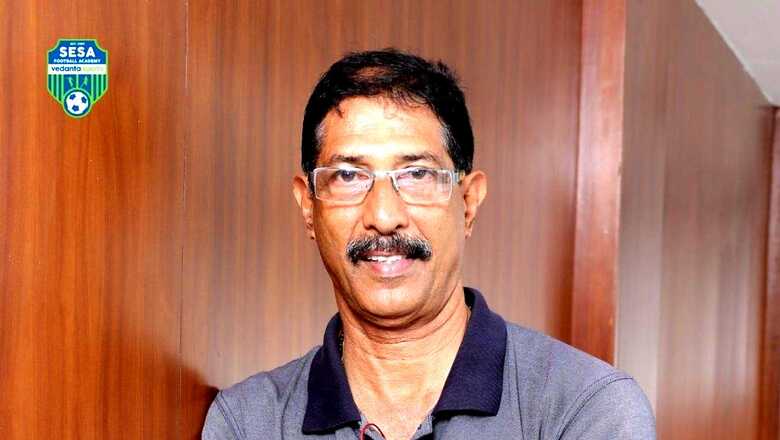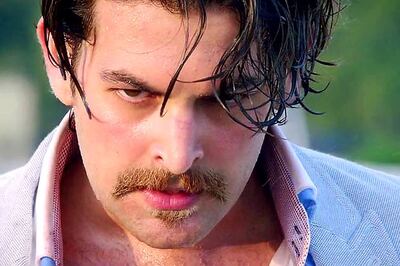
views
Brahmanand Sankhwalkar, 67, joined a handful of footballers to be honoured with the Padma Shri award. India goalkeeper, later national team captain, India goalkeeping coach and currently engaged in the sport’s development and promotion, he is a footballing institution himself and a known face in every football hotspot across the nation. Other players to receive the civilian award before him were Gostho Pal, Sailen Manna, Chuni Goswami, P K Banerjee, Bhaichung Bhutia, Oinam Bembem Devi and Sunil Chhetri.
Brahmanand stood out from his teammates and seniors in the technical and mental aspects. Goalkeeping is a specialised skill with limited opportunities, usually two custodians get selected for any squad at club, state, national level. To get into the first team demands temperament, to keep your place is tougher. Named the Player of the Decade 1985-1995 by the All India Football Federation (AIFF), he delivered under the crossbar for Salgaocar Sports Club), Goa state and India at the Asian Games and Nehru Cups.
During a career spanning more than 70 international matches, reflexes and judgement in goal earned him nicknames, the ‘Leopard’ being a special label earned on an exposure tour in 1977 to Zambia. Africa is a football-mad continent, reference to one of the big cats was made during a felicitation for the Indian team. The visitors won one out of three matches against an attacking Zambian side displaying the African flair, with Brahmanand’s show under the bar highlighted by a local dignitary.
The knack of giving forwards a feeling of being almost unbeatable in goal is a hallmark of his game. Exceptional focus is one of the reasons behind emergence as one of India’s best during his time. The outcome of meditation, now termed as mind training in sports psychology. “I was walking to play one of the Bandodkar Gold Cup matches, walking down a street in Margao and spotted a book stall. I walked in to see what they were selling. The book ‘How To Meditate’ caught my eye. Every page was a step towards understanding breathing control.”
He added: “Inhale and exhale was one count, to be repeated thrice and then back to step one. I began to understand how to compose myself, lying on the bed in my room before a key game and doing the breathing counts. During a match, it helped sharpen my focus. I do that before a big moment or a big decision to this day.” For a sportsperson actively involved in pursuit of athletic activity, reading on spirituality is not the choice for most players, who switch off football by chasing their passions or hobbies.
He also explored the Bhagwat Gita, a book on the spiritual path which became part of his football kit from club days, on tour for tournaments and in national camps. “I found it tough to understand at first, then got hold of a condensed version,” quipped the Salgaocar star, making a mark for Goa in the Santosh Trophy National Football and going on to lead India. “Whatever the choices you make in life, one should keep himself rolling, without worrying about the fruits of the efforts. If the fruit comes your way, enjoy it.”
His career so far is a merger of various roles, from playing-coaching-talent spotting to administration, currently busy in football promotion with the Goa Football Development Council. Football-wise, he moved from club class, to state and national as a performer, was identified as a leader early at the club level and climbed up the ladder. Post-retirement, he stepped into educating himself on coaching with the aim of nurturing talent in home state. The India goalkeeping coach is associated with the Sports Authority of Goa (SAG), Sesa Football Academy.
Playing veterans football is a part of a weekly routine for the Arjuna awardee. Indian football has mostly handed captaincy to players from high-profile Kolkata clubs due to their big-match experience. Brahmanand was the choice of national coaches for leadership, despite refusing offers from Kolkata clubs and remaining a Goa faithful. He could have named his price when clubs called, but opted to inspire home talent with performances for India. In a way, he is giving back what he got as backing from club coaches, officials.
Salgaocar coach, T Shanmugham, was a big influence in thinking positive. “I am lucky in many respects. In 1980 when in Mumbai to play the Rovers Cup (for Salgaocar), physically and mentally I was low on confidence. After a semi-final loss to Mohammedan Sporting, I met our coach, a very positive person in defeats or victories. I then met Henry Britto, our manager, who asked me if the sun will stop rising tomorrow (because of a football result). He advised me to put setbacks behind and look ahead, just like the sunrise after a dark night. I got some strength from his words.”
From those tentative steps, he retired as a consistent, dependable custodian. Keeping a clean sheet is a key statistic referred to with pride by modern goalkeepers. Brahmanand did not allow a single goal against him through a tournament, Goa won the 1984 Santosh Trophy without losing any match. “It happened due to collective effort, no one player can get credit,” said the state captain. “Coach Shanmugham asked me to keep a clean slate, he wanted to go home with the trophy winning outright.”
The breathing control habit continued. “I used to do a lot of these, early morning and before going to sleep, before the team coach meeting us players pre-match or half-time.” Goa beat Punjab for the title, a year before the state had drawn goalless against Bengal in Kolkata to emerge joint winners in the 1983 Santosh Trophy. “Understanding the defenders around you is important, guarding the goal is not one person’s job. Motivation plays a part. Performing in front of huge crowds in Kolkata, Kerala, Goa, Tamil Nadu I relished.” He represented Goa in Santosh Trophy 17 years in all.
Responding to a query about advice to current goalkeepers about keeping a clean sheet, Brahmanand, an Arjuna awardee, said: “Keeping a clean sheet is good, but a goalkeeper should not take pressure chasing it, should not be obsessed. Motivation for the club is very important. For me, wearing the team jersey was enough, especially stepping out to play in national colours.” He played at a time when India faced the best Asian sides at the Merdeka Cup, Kings Cup, Asian Games (1982 New Delhi and 1986 Seoul).
The Nehru Cup brought World Cuppers to Indian shores, in response to invitations from the AIFF to international federations. Putting a finger on the difference in approach, more matches was played during his India days. “Match exposure leads to player development. Working on individual players in training camps is good, you need game experience to implement lessons, make changes. National teams should get more international games, before expecting improvement.” He played four Nehru Cups, faced European, South American, African and Asian teams.
The Padma Shri award will be a jewel in his collection. “I thank the Almighty, my parents and family members, teammates and fans who drove me to reach this level.” Life rolls on for an icon who tapped the spiritual aspect to excel, drew strength from meditation and on the move with talent spotting, game development. “Everyone comes together for football is my experience, despite the differences and varied views,” states the energetic 67-year-old from Taleigao, involved in a project in Goa under the umbrella of Association for Wellbeing of Elder Sportspersons.



















Comments
0 comment